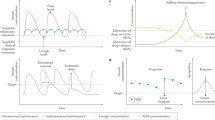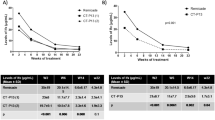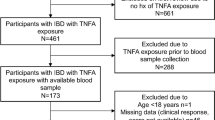Abstract
Anti-tumor necrosis factor alpha (anti-TNFα) inhibitors are used extensively for the management of moderate to severe inflammatory bowel disease (IBD) in both adult and pediatric patients. Unfortunately, not all patients show an optimal response to induction therapy, while others lose their response over time for reasons yet poorly understood. We report on a pharmacokinetic/pharmacogenetic approach to monitor the therapy with anti-TNFα in a real-world cohort of seventy-nine pediatric patients affected by IBD that was analyzed retrospectively. We evaluated plasma concentrations of infliximab, adalimumab, and related anti-drug antibodies (ADAs), and single nucleotide polymorphisms (SNPs) in genes involved in immune processes and inflammation on the anti-TNFα response. We found a significant association between the SNP in TNFα promoter (−308G>A) and clinical remission without steroids in patients on infliximab therapy. Additionally, a potential connection between HLA-DQA1*05 genetic variant carriers and a higher risk of anti-TNFα immunogenicity emerged.
This is a preview of subscription content, access via your institution
Access options
Subscribe to this journal
Receive 6 print issues and online access
$259.00 per year
only $43.17 per issue
Buy this article
- Purchase on Springer Link
- Instant access to full article PDF
Prices may be subject to local taxes which are calculated during checkout

Similar content being viewed by others
Data availability
The data that support the findings of this study are available from the corresponding author, EC, upon reasonable request.
Change history
25 May 2023
A Correction to this paper has been published: https://doi.org/10.1038/s41397-023-00311-0
References
Sýkora J, Pomahačová R, Kreslová M, Cvalínová D, Štych P, Schwarz J. Current global trends in the incidence of pediatric-onset inflammatory bowel disease. World J Gastroenterol. 2018;24:2741–63.
Ng SC, Shi HY, Hamidi N, Underwood FE, Tang W, Benchimol EI, et al. Worldwide incidence and prevalence of inflammatory bowel disease in the 21st century: a systematic review of population-based studies. Lancet 2017;390:2769–78.
Abraham BP, Mehta S, El-Serag HB. Natural history of pediatric-onset inflammatory bowel disease: a systematic review. J Clin Gastroenterol. 2012;46:581–9.
Aardoom MA, Veereman G, de Ridder L. A review on the use of anti-TNF in children and adolescents with inflammatory bowel disease. Int J Mol Sci. 2019;20:2529.
Hyams JS, Griffiths A, Markowitz J, Baldassano RN, Faubion WA Jr, Colletti RB, et al. Safety and efficacy of adalimumab for moderate to severe Cr’hn’s disease in children. Gastroenterology. 2012;143:365–74. e2
de Buck van Overstraeten A, Wolthuis A, D’Hoore A. Surgery for Crohn’s disease in the era of biologicals: a reduced need or delayed verdict? World J Gastroenterol. 2012;18:3828–32.
Fernandes SR, Bernardo S, Simões C, Gonçalves AR, Valente A, Baldaia C, et al. Proactive infliximab drug monitoring is superior to conventional management in inflammatory bowel disease. Inflamm Bowel Dis. 2020;26:263–70.
Gisbert JP, Chaparro M. Predictors of primary response to biologic treatment [Anti-TNF, Vedolizumab, and Ustekinumab] in patients with inflammatory bowel disease: from basic science to clinical practice.J Crohns Colitis. 2020;14:694–709.
Kennedy NA, Heap GA, Green HD, Hamilton B, Bewshea C, Walker GJ, UK Inflammatory Bowel Disease Pharmacogenetics Study Group et al. Predictors of anti-TNF treatment failure in anti-TNF-naive patients with active luminal Crohn’s disease: a prospective, multicentre, cohort study. Lancet Gastroenterol Hepatol. 2019;4:341–53.
Franca R, Curci D, Lucafò M, Decorti G, Stocco G. Therapeutic drug monitoring to improve outcome of anti-TNF drugs in pediatric inflammatory bowel disease. Expert Opin Drug Metab Toxicol. 2019;15:527–39.
Assa A, Matar M, Turner D, Broide E, Weiss B, Ledder O, et al. Proactive monitoring of adalimumab trough concentration associated with increased clinical remission in children with crohn’s disease compared with reactive monitoring. Gastroenterology 2019;157:985–996.e2.
Sánchez-Hernández JG, Rebollo N, Martin-Suarez A, Calvo MV, Muñoz F. A 3-year prospective study of a multidisciplinary early proactive therapeutic drug monitoring programme of infliximab treatments in inflammatory bowel disease. Br J Clin Pharm. 2020;86:1165–75.
Kelly OB, Donnell SO, Stempak JM, Steinhart AH, Silverberg MS. Therapeutic drug monitoring to guide infliximab dose adjustment is associated with better endoscopic outcomes than clinical decision making alone in active inflammatory bowel disease. Inflamm Bowel Dis. 2017;23:1202–9.
Jongsma MME, Winter DA, Huynh HQ, Norsa L, Hussey S, Kolho KL, Paediatric IBD Porto Group of ESPGHAN et al. Infliximab in young paediatric IBD patients: it is all about the dosing. Eur J Pediatr. 2020;179:1935–44.
Papamichael K, Juncadella A, Wong D, Rakowsky S, Sattler LA, Campbell JP, et al. Proactive therapeutic drug monitoring of adalimumab is associated with better long-term outcomes compared to standard of care in patients with inflammatory bowel disease. J Crohns Colitis. 2019;13:976–81.
Restellini S, Chao CY, Lakatos PL, Aruljothy A, Aziz H, Kherad O, et al. Therapeutic drug monitoring guides the management of Crohn’s patients with secondary loss of response to adalimumab. Inflamm Bowel Dis. 2018;24:1531–8.
Lucafò M, Franca R, Selvestrel D, Curci D, Pugnetti L, Decorti G, et al. Pharmacogenetics of treatments for inflammatory bowel disease. Expert Opin Drug Metab Toxicol. 2018;14:1209–23.
Prajapati R, Plant D, Barton A. Genetic and genomic predictors of anti-TNF response. Pharmacogenomics. 2011;12:1571–85.
Balding J, Livingstone WJ, Conroy J, Mynett-Johnson L, Weir DG, Mahmud N, et al. Inflammatory bowel disease: the role of inflammatory cytokine gene polymorphisms. Mediators Inflamm. 2004;13:181–187.
Fragoso JM, Vargas‐Alarcón G, Jiménez‐Morales S, Reyes‐Hernández OD, Ramírez‐Bello J. Tumor necrosis factor alpha (TNF‐α) in autoimmune diseases (AIDs): molecular biology and genetics. Gac Med Mex. 2014;150:334–344.
Elahi MM, Asotra K, Matata BM, Mastana SS. Tumor necrosis factor alpha -308 gene locus promoter polymorphism: an analysis of association with health and disease. Biochim Biophys Acta. 2009;1792:163–72.
Bouma G, Crusius JBA, Pool MO, Kolkman JJ, Blomberg BMEV, Kostense PJ, et al. Secretion of Tumour Necrosis Factor α and Lymphotoxin α in Relation to Polymorphisms in the TNF Genes and HLA-DR Alleles. Relevance for Inflammatory Bowel Disease. Scand J Immunol. 1996;43:456–63.
Kroeger KM, Carville KS, Abraham LJ. The −308 tumor necrosis factor-α promoter polymorphism effects transcription. Mol Immunol. 1997;34:391–9. [Google Scholar] [CrossRef]
Tong Q, Zhao L, Qian XD, Zhang LL, Xu X, Dai SM, et al. Association of TNF-α polymorphism with prediction of response to TNF blockers in spondyloarthritis and inflammatory bowel disease: a meta-analysis. Pharmacogenomics. 2013;14:1691–700.
Song GG, Seo YH, Kim JH, Choi SJ, Ji JD, Lee YH. Association between TNF-α (-308 A/G, -238 A/G, -857 C/T) polymorphisms and responsiveness to TNF-α blockers in spondyloarthropathy, psoriasis and Crohn’s disease: a meta-analysis. Pharmacogenomics. 2015;16:1427–37.
Curci D, Lucafò M, Cifù A, Fabris M, Bramuzzo M, Martelossi S, et al. Pharmacogenetic variants of infliximab response in young patients with inflammatory bowel disease. Clin Transl Sci. 2021;14:2184–92.
Sazonovs A, Kennedy NA, Moutsianas L, Heap GA, Rice DL, Reppell M.PANTS Consortium et al. HLA-DQA1*05 carriage associated with development of anti-drug antibodies to infliximab and adalimumab in patients with Crohn’s disease. Gastroenterology. 2020;158:189–99.
Wilson A, Peel C, Wang Q, Pananos AD, Kim RB. HLA-DQA1*05 genotype predicts anti-drug antibody formation and loss of response during infliximab therapy for inflammatory bowel disease. Aliment Pharm Ther. 2020;51:356–63.
Levine A, Koletzko S, Turner D, Escher JC, Cucchiara S, de Ridder L, European Society of Pediatric Gastroenterology, Hepatology, and Nutrition et al. ESPGHAN revised porto criteria for the diagnosis of inflammatory bowel disease in children and adolescents. J Pediatr Gastroenterol Nutr. 2014;58:795–806.
van Rheenen PF, Aloi M, Assa A, Bronsky J, Escher JC, Fagerberg UL, et al. The medical management of paediatric Crohn’s disease: an ECCO-ESPGHAN guideline update. J Crohns Colitis. 2020:jjaa161. https://doi.org/10.1093/ecco-jcc/jjaa161.
Turner D, Ruemmele FM, Orlanski-Meyer E, Griffiths AM, de Carpi JM, et al. Management of paediatric ulcerative colitis, Part 1: ambulatory care-An Evidence-based guideline From Europe’s Crohn’s and Colitis Organization and European Society of Paediatric Gastroenterology, Hepatology and Nutrition. J Pediatr Gastroenterol Nutr. 2018;67:257–91.
Levine A, Griffiths A, Markowitz J, Wilson DC, Turner D, Russell RK, et al. Pediatric modification of the Montreal classification for inflammatory bowel disease: the Paris classification. Inflamm Bowel Dis. 2011;17:1314–21.
Vande Casteele N, Ferrante M, Van Assche G, Ballet V, Compernolle G, et al. Trough concentrations of infliximab guide dosing for patients with inflammatory bowel disease. Gastroenterology 2015;148:1320–9. e3
Imbrechts M, Van Stappen T, Compernolle G, Tops S, Gils A. Anti-infliximab antibodies: how to compare old and new data? J Pharm Biomed Anal. 2020;177:112842.
Aloi M, Lionetti P, Barabino A, Guariso G, Costa S, Fontana M.SIGENP IBD Group et al. Phenotype and disease course of early-onset pediatric inflammatory bowel disease. Inflamm Bowel Dis. 2014;20:597–605.
Irving PM, Gecse KB. Optimizing therapies using therapeutic drug monitoring: current strategies and future perspectives. Gastroenterology. 2022;162:1512–24.
Targownik LE, Nugent Z, Singh H, Bernstein CN. Prevalence of and outcomes associated with corticosteroid prescription in inflammatory bowel disease. Inflamm Bowel Dis. 2014;20:622–30.
Kandavel P, Eder SJ, Adler J, and the ImproveCareNow Network Pediatric IBD Learning Health System. Reduced systemic corticosteroid use among pediatric patients with inflammatory bowel disease in a large learning health system. J Pediatr Gastroenterol Nutr. 2021;73:345–51.
Melmed GY, Siegel CA. Quality improvement in inflammatory bowel disease. Gastroenterol Hepatol 2013;9:286–92.
Miler M, Nikolac, Gabaj N, Ćelap I, Grazio S, Tomašić V, et al. Association of polymorphisms in promoter region of TNF-α -238 and -308 with clinical outcomes in patients with immune-mediated inflammatory diseases on anti-TNF therapy. Rheumatol Int. 2021;41:2195–203.
Netz U, Carter JV, Eichenberger MR, Dryden GW, Pan J, Rai SN, et al. Genetic polymorphisms predict response to anti-tumor necrosis factor treatment in Crohn’s disease. World J Gastroenterol. 2017;23:4958–67.
López-Hernández R, Valdés M, Campillo JA, Martínez-Garcia P, Salama H, Salgado G, et al. Genetic polymorphisms of tumour necrosis factor alpha (TNF-α) promoter gene and response to TNF-α inhibitors in Spanish patients with inflammatory bowel disease. Int J Immunogenet. 2014;41:63–68.
O’Rielly DD, Roslin NM, Beyene J, Pope A, Rahman P. TNF-alpha-308 G/A polymorphism and responsiveness to TNF-alpha blockade therapy in moderate to severe rheumatoid arthritis: a systematic review and meta-analysis. Pharmacogenomics J. 2009;9:161–7.
Baseggio L, Bartholin L, Chantome A, Charlot C, Rimokh R, Salles G. Allele-specific binding to the -308 single nucleotide polymorphism site in the tumour necrosis factor-alpha promoter. Eur J Immunogenet. 2004;31:15–9.
Wilson AG, Symons JA, McDowell TL, McDevitt HO, Duff GW. Effects of a polymorphism in the human tumor necrosis factor alpha promoter on transcriptional activation. Proc Natl Acad Sci USA. 1997;94:3195–9.
Cheli S, Cozzi V, Cattaneo D, Norsa L, De Giacomo C, et al. Fast clearance of anti-TNFα agents unrelated to antidrug antibodies: a case report. Eur J Clin Pharm. 2022;78:891–3.
Cohen RZ, Schoen BT, Kugathasan S, Sauer CG. Management of anti-drug antibodies to biologic medications in children with inflammatory bowel disease. J Pediatr Gastroenterol Nutr. 2019;69:551–6.
Author information
Authors and Affiliations
Contributions
SC and GZ were responsible for the conception and design of the analysis. SC and DS verified the analytical methods and performed the experiments. AD contributed to the statistical analysis of the sample data. LN, NS, FP, DD, RP, and GZ collaborated in patient management and clinical presentation. DC contributed to study design, data analysis, and manuscript writing. EC directed and supervised the study and the writing of the manuscript. All authors provided critical feedback and contributed to the manuscript.
Corresponding author
Ethics declarations
Competing interests
The authors declare no competing interests.
Additional information
Publisher’s note Springer Nature remains neutral with regard to jurisdictional claims in published maps and institutional affiliations.
The original online version of this article was revised: Table 3 has been corrected.
Supplementary information
Rights and permissions
Springer Nature or its licensor (e.g. a society or other partner) holds exclusive rights to this article under a publishing agreement with the author(s) or other rightsholder(s); author self-archiving of the accepted manuscript version of this article is solely governed by the terms of such publishing agreement and applicable law.
About this article
Cite this article
Cheli, S., Savino, D., De Silvestri, A. et al. One year of experience with combined pharmacokinetic/pharmacogenetic monitoring of anti-TNF alpha agents: a retrospective study. Pharmacogenomics J 23, 112–118 (2023). https://doi.org/10.1038/s41397-023-00304-z
Received:
Revised:
Accepted:
Published:
Issue Date:
DOI: https://doi.org/10.1038/s41397-023-00304-z



